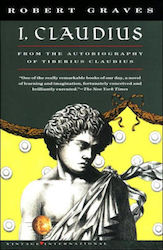
Maybe I’m just in a slump, especially when it comes to ancient Rome, but I went into this book with such high expectations. It’s my read this month from the Pop Chart Lab list of 100 Essential Novels. And it’s one I had not read before so I was excited for it on a number of levels. First, it’s marketed as a classic of historic fiction, a sub-genre I am very interested in these days. Second, it won a slew of literary prizes in the 1930s. And third, it covers a period in history that should be fascinating.
But just no. It didn’t appeal to me at all, I’m afraid, and I suffered through every one of the nearly 500 pages. (I need to DNF books like this.)
The novel’s premise is that it’s the first part of Claudius’s autobiography, going through the reigns of Augustus, Tiberius, and Caligula, up until the day when Claudius is made Emperor after Caligula’s assassination. The second part, which I doubt I’ll read, is Claudius the God.
I think what ruined my chance at enjoying this work is the premise itself. As Claudius’s fictional autobiography, it immediately moves from the realm of “showing” to one of “telling,” and the entire book felt like a loosely related collection of anecdotes. For every interesting one, there are a dozen tedious ones. There is no cohesive narrative to keep my interest. Perhaps that’s more “authentic”? I don’t know. It certainly didn’t make it more enjoyable to read. And call me old-fashioned (you won’t be the first to do so), but that remains a novelist’s prime task. I don’t care how clever or learned the author is, if the story doesn’t entertain, it is for me a failed book.
Robert Graves was a noted historian, of course. I am not, however, and the sheer weight of the hundreds of names (many of which are variations of each other) simply blur into a mass of irrelevant data for me. Ultimately this proved a big disappointment because I was so convinced I would love the novel. Added to my recent huge disappointment with SPQR, I believe I’m done with ancient Rome for now. I need a palette cleanser.
But just no. It didn’t appeal to me at all, I’m afraid, and I suffered through every one of the nearly 500 pages. (I need to DNF books like this.)
The novel’s premise is that it’s the first part of Claudius’s autobiography, going through the reigns of Augustus, Tiberius, and Caligula, up until the day when Claudius is made Emperor after Caligula’s assassination. The second part, which I doubt I’ll read, is Claudius the God.
I think what ruined my chance at enjoying this work is the premise itself. As Claudius’s fictional autobiography, it immediately moves from the realm of “showing” to one of “telling,” and the entire book felt like a loosely related collection of anecdotes. For every interesting one, there are a dozen tedious ones. There is no cohesive narrative to keep my interest. Perhaps that’s more “authentic”? I don’t know. It certainly didn’t make it more enjoyable to read. And call me old-fashioned (you won’t be the first to do so), but that remains a novelist’s prime task. I don’t care how clever or learned the author is, if the story doesn’t entertain, it is for me a failed book.
Robert Graves was a noted historian, of course. I am not, however, and the sheer weight of the hundreds of names (many of which are variations of each other) simply blur into a mass of irrelevant data for me. Ultimately this proved a big disappointment because I was so convinced I would love the novel. Added to my recent huge disappointment with SPQR, I believe I’m done with ancient Rome for now. I need a palette cleanser.
 RSS Feed
RSS Feed
